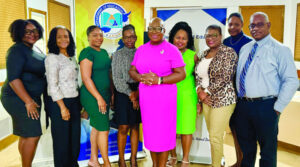
A UNICEF/UNESCO consultation on Transforming Education on Anguilla was held on 23 April 2024 at the Ellen Conference Room at La Vue Boutique Inn. The consultation was the second of a three-part activity for Anguilla; the first held in March engaged with Department of Education staff, the second with youth and community organisations and social departments and the third is planned with Anguilla’s Education Task Force and is expected to occur later this month.
The UNICEF/UNESCO Transforming Education Project for British Overseas Territories (BOTs) hopes to replicate work that was done for the Eastern Caribbean once it was recognised that the BOTs had specific peculiarities that should be addressed outside what they might share with other Caribbean countries. The UNICEF/UNESCO Transforming Education Project is a response to concerns about the extent to which COVID-19 exacerbated pre-existing inequalities in the education system leading to learning loss, knowledge gaps and a less than ideal student learning experience.
Anguilla’s work on education transformation predated this UNICEF/UNESCO initiative. The island began its visioning process back in 2020/2021. The Ministry of Social Development and Education and the Department of Education, in consultation with key stakeholders, identified areas considered vital for Anguilla to position its youth to fulfill their highest personal and educational goals as well as the country’s broader economic development goals.
This led to the creation of three task forces (the Education Task Force) mandated to take a deeper dive to assess and make recommendations on (1) curriculum review, (2) teaching methods review and (3) teacher/leadership quality.
Another outcome was the development of the National Education Development Plan 2020 – 2025 which listed national priorities as follows; (1) addressing the changing needs of students and student engagement, (2) embracing and optimising technology and technological advances, (3) holistic human resource development, (4) enhancing the teaching and learning environment and (5) English as a second language – addressing a changing landscape.
Thus far the Department of Education has undertaken a number of initiatives that address these national priorities. For example, work on priority area 2 is underscored by the launch of Project Inspire, a technology integration in education project in three of the island’s 6 public schools, namely Orealia Kelly Primary School, Vivien Vanterpool Primary School and Alwyn Allison Richardson Pimary School. Priority area 5 has been responded to through the introduction of the Intensive English Centre (IEC) which has now relocated to ALHCS at Campus A for fuller integration into the student population. And earlier this year, the Department of Education integrated focus on priorities 1 and 3 by hosting the first ever national symposium on instructional leadership (NSILA 2024) themed “Accelerate Excellence: Empowering Leaders Transforming Education”.
The UNICEF/UNESCO Transforming Education consultations are facilitated by Dr Gale Rigobert, who is the newly appointed Dean at the University of St Maarten. The UNICEF/UNESCO Transforming Education agenda is built around 6 distinct themes; inclusive, equitable, safe and healthy schools, learning and skills for life, work and sustainable development, teachers, teaching and the teaching profession, digital learning and transformation, financing education and navigating the political landscape and its impact on transforming education.
For more information on the UNICEF/UNESCO Transforming Education mandate go to www.unesco.org/ and search for ‘Transforming Education Summit’. To learn more about Anguilla’s national education priorities email education.mailbox@gov.ai and request the report.








